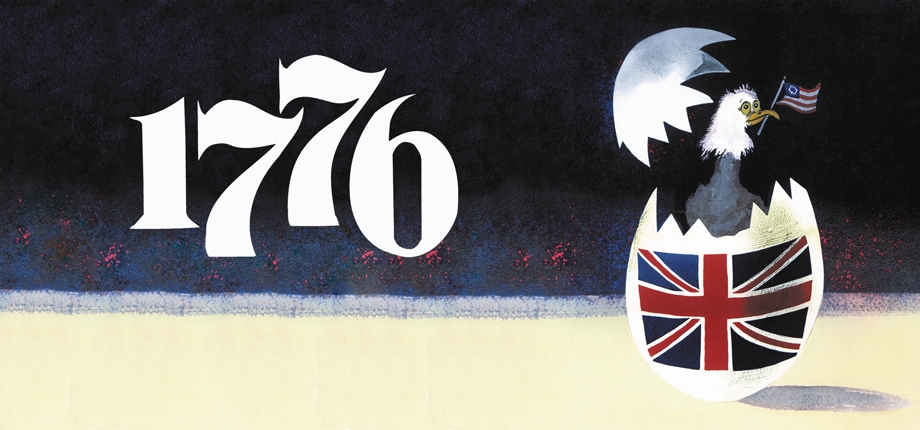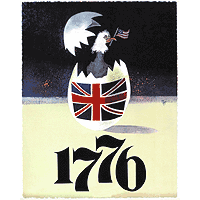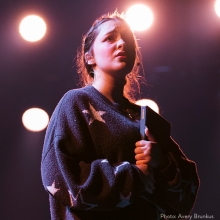All-Female Cast of 1776 Revisited

All-Female Cast of 1776 Revisited
 Last summer Playbill.com reported an exciting new twist on one of MTI’s shows – an all-female cast of 1776! (Read the article here, and the original Marquee blog post about it here). In the article, Keith Edwards, son of the show’s composer/lyricist, the late Sherman Edwards, remarked that he hoped that that concert reading production at Musical Theater Heritage in Kansas City, MO would open the show up to other theaters that didn’t have the number of male of actors required to produce the show conventionally. With next summer and the 4th of July approaching, it seems appropriate to revisit the value of producing this show with an all female cast, especially at this particular moment in history.
Last summer Playbill.com reported an exciting new twist on one of MTI’s shows – an all-female cast of 1776! (Read the article here, and the original Marquee blog post about it here). In the article, Keith Edwards, son of the show’s composer/lyricist, the late Sherman Edwards, remarked that he hoped that that concert reading production at Musical Theater Heritage in Kansas City, MO would open the show up to other theaters that didn’t have the number of male of actors required to produce the show conventionally. With next summer and the 4th of July approaching, it seems appropriate to revisit the value of producing this show with an all female cast, especially at this particular moment in history.
The reasons to produce 1776 as a show are numerous, traditional casting or not. Peter Stone’s book is lauded by many as being one of the best books for a musical ever written, which is quite an accomplishment. The show puts a human face on a story that most Americans feel they know well, but often only on a superficial, distant, historical level. Full of comedy and engaging characters, not to mention a score with more than one memorable tune, it’s not surprising that theaters are looking for ways to make it more producible – but what about doing an all female version, specifically, is so resonant for this show?
There’s no question that women in 2011 have significantly more opportunities than our 1776 counterparts, and we’ve made gains in civil rights and equality even since the original production of the show in 1969. However, we still can’t say that there is the kind of equality in the United States that the ideals set forward in the Declaration of Independence and Bill of Rights suggest that we as a nation strive for. For example, in the current 112th Congress out of 100 senators, only 17 are women, and out of 435 representatives, just 75 are women. These numbers are just some of many similar statistics that indicate a gap in parity between men and women in the contemporary U.S. –the gender gap in salaries, the ratio of men to women who are CEOs, and the challenges associated with women finding affordable health care are all issues that have made recent headlines. In light of how far women have come and how far we have to go, presenting an all-female version of 1776 is an exciting opportunity. This nontraditional spin on the musical connects women to a legacy of American idealism and freedom from which we have too often been disenfranchised. By casting women actors in the iconic roles of John Adams, Benjamin Franklin, and Thomas Jefferson, 1776 the musical becomes a link between what America is and what it aspires to be.
An all-female version of 1776 certainly isn’t a cure-all for the challenges faced by women today, nor does it do anything to change the practical impact of the numbers I cited before. However, one of the great things about theater is that musicals can help us see the world from a different viewpoint, and that new perspective may in turn allow us to make practical changes. Taking the story of the signing of the Declaration of Independence, a story that is familiar and very traditionally associated with a certain group of powerful men, and opening it up to include women creates a space to think about and talk about how women fit into the vision expressed in the text and the history of 1776. This new approach to the show has the potential introduce the show to many new actors and audiences, just as Keith Edwards hopes it will, and though the casting may not be reflective of the original piece, the spirit certainly is.
To learn more about licensing 1776 click here or to see show photos, find out about rentals or see upcoming productions visit the show page on MTI Showspace.
EllaRC is a bookwriter/lyricist and musical theatre lover. She’s a new contributor to MTI Marquee – add her as a friend on MTI Showspace or check out her musical theatre and social justice blog, StageLeft.
























